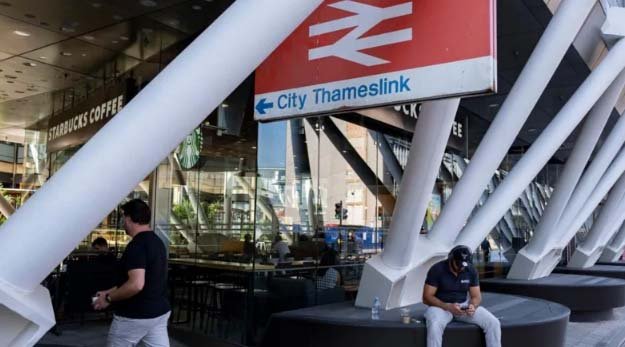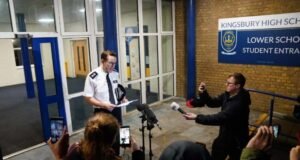
About one in 13 scheduled stops at City Thameslink were cancelled over the past year
City Thameslink in London has been named the worst of Britain’s busiest railway stations for cancellations in the year to August.
About one in 13 of almost 150,000 scheduled stops there were cancelled during that time, according to Office of Rail and Road (ORR) figures analysed by BBC.
Those cancellations were among about three million cancelled stops in Britain of a scheduled 89 million.
The government says it is determined to drive up standards as it delivers what it describes as the biggest overhaul of the railways in a generation.
Action to improve the reliability of services cannot come soon enough for passengers like 23-year-old Cat Edge, a student from Surrey who contacted the BBC via Your Voice, Your BBC News.
One in 10 train stops were cancelled at her local train station of Earlswood in the year to August 2025.
She said when trains were delayed and trying to make up the time to reach bigger stops like nearby Gatwick, stops at smaller stations like hers were cancelled.
Despite leaving extra time, Cat said she was often late for university.
“It does feel like I miss out and come across poorly,” she said. “It’s difficult with professors who themselves have busy schedules, trying to say, ‘oh, can I have a 20-minute lenience window?’ It’s quite embarrassing.”
Earlswood had the sixth worst cancellation rate of any train station in Britain in the past year, excluding a small number of stations with unreliable or incomplete data.
It is managed by Thameslink, also in charge of City Thameslink station, which had the worst cancellation rate of Britain’s 100 busiest stations.
Cat said: “It’s so stressful, especially if when you get on a train, it’s dark and you don’t know whether it’s actually going to stop at your station. It’s scary.”
She said she would welcome more advance notice if a train is not stopping at her station and would like more reliable trains late at night.
“That’s when it’s the worst and you’re the most vulnerable,” she added.
Emma Pickard, network operations and performance director for Thameslink and Network Rail, said they were “deeply sorry” for the disruption experienced by passengers.
She said Thameslink had been working hard to make services more reliable, tackling issues such as signalling and power supply faults, improving traincrew availability, and investing to make the network more resilient to severe weather and other unexpected events.
“When incidents outside our control do occur, such as poor weather or trespass we aim to restore the service as quickly as possible, however on a network as busy and complex as Thameslink’s the disruption can be felt widely,” she said.
“At times we have to make the very difficult decision to cancel some trains to get the timetable back on track.”
The operator added that trains arrive at City Thameslink in central London every 3.5 minutes but flooding shut it in February for two days, causing significant disruption.
‘I was walking until midnight’
The issue of trains being cancelled late at night can be particularly difficult for passengers in rural areas.
Sheila O’Donnell, 73, lives in Arnside in Cumbria. She said her train was often cancelled when getting home from work or out seeing friends in nearby cities.
Our data shows one in 17 planned stops from the station ended up being cancelled in the past year.
“It happens so often, I’m resigned to it,” she said. “The worst one I’ve had, I was on the train to Liverpool to celebrate somebody’s big birthday, I got back to Lancaster at 21:10 to find the next train had been cancelled.”
A friend dropped her at the bus station but the nearest stop was still a walk of 4.5 miles (7.24 km) from her home.
“I couldn’t get a taxi,” she said. “From 22:30 to midnight, I had to walk home along the dark country lane. Hardly any lights and I needed the torch on my phone.”
BBC analysis calculated the percentage of cancelled stops out of those scheduled for the last 13 periods of data published by the Office of Rail and Road.
Out of all 2,549 stations, 78 were excluded from the analysis due to missing or unreliable data. This differs from the cancellation analysis by the Rail Delivery Group, which represents Network Rail and train operators.
Michael Solomon Williams from Campaign for Better Transport said around three million train cancellations was “simply unacceptable” and eroding faith in the railways.
“We need a reliable, affordable and accessible rail network to deliver economic growth, increase productivity and reduce carbon emissions,” he said.
He called for “tougher targets, automatic compensation, and proper investment to restore trust” with the rail industry and government collaborating.
Peter Howard, 58, commutes from Macclesfield to London. After several cancellations during the pandemic, he decided to avoid trains altogether.
“I just got fed up with it,” he said. “I thought I’m not taking that risk any more and I ended up driving.”
Over the years, Peter said train cancellations meant he had missed work meetings and his son’s sports day as well as being unable to make school pick-ups.
He said: “They were the ones that hurt the most. There’d be that sense of disappointment – ‘dad’s not here, he should have been’.”
Peter has since returned to using the trains and feels the situation has improved recently, but added: “There was a period, I think last year in the summer, where it was something of a Russian roulette as to whether the train had turned up or not.”
The data shows that, in the past year, one in 24 planned stops ended up being cancelled in Macclesfield.
Are train cancellations going down?
A Department for Transport (DfT) spokesperson said operators would have to meet “rigorous, bespoke standards” under its plans to renationalise rail services in Britain.
Great British Railways, a new arm’s length body, will oversee the rail system in England, Wales and Scotland in a move that the government hopes will bring savings while also reducing delays and cancellations.
The legislation needed to establish the new body is still due to go through parliament, but some services have already been transferred into public ownership as franchises held by private companies start to expire. All services are expected to be publicly owned by the end of 2027.
The DfT said it was already starting to see “positive signs of progress with overall cancellations starting to fall”.
On the face of it, the number of cancelled train stops has gone down in the most recent four-week period, when compared to the period just before or the same period last year.
However, the cancellation rate for the past year was still slightly higher than the previous one – 3.3%, up from 3.2%.
A Rail Delivery Group spokeperson said train operators “spare no effort to maintain as many services as possible” but extreme weather, infrastructure faults and trespass could have an impact.
It apologised to those affected, saying it had introduced Visual Disruption Maps – videos to help passengers navigate service changes – and was raising awareness of the Delay Repay scheme to simplify compensation.
 Weekly Bangla Mirror | Bangla Mirror, Bangladeshi news in UK, bangla mirror news
Weekly Bangla Mirror | Bangla Mirror, Bangladeshi news in UK, bangla mirror news







